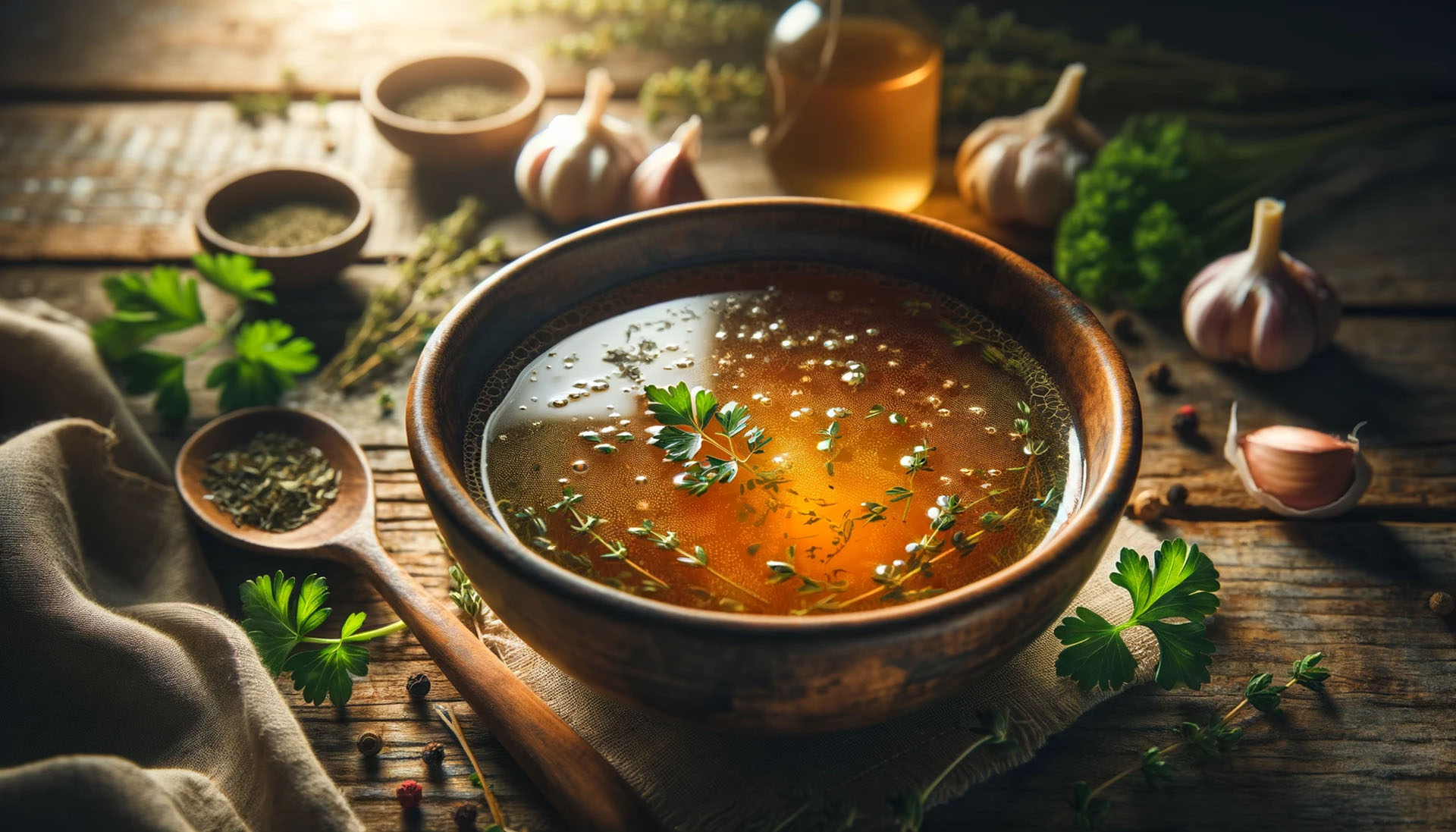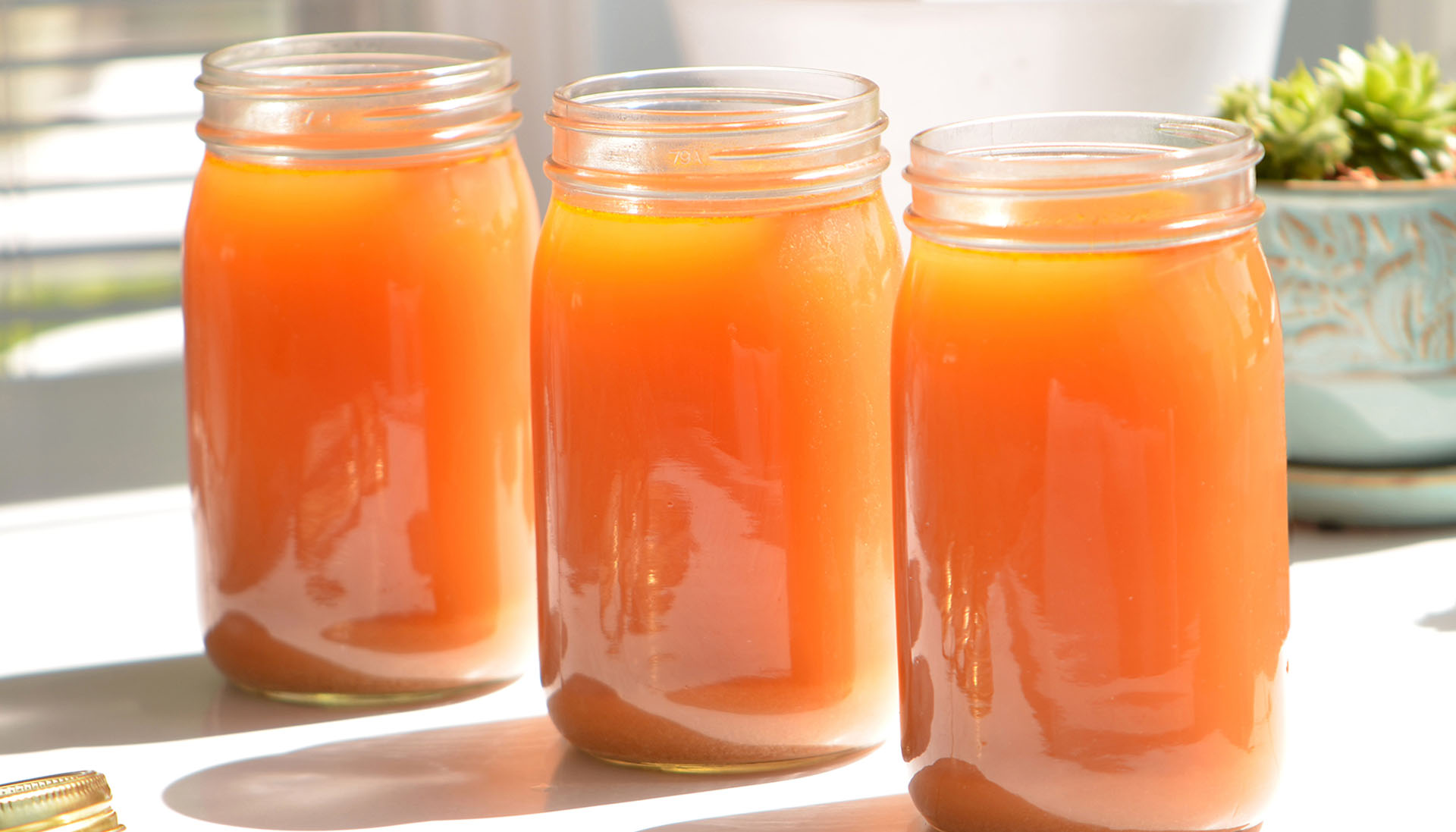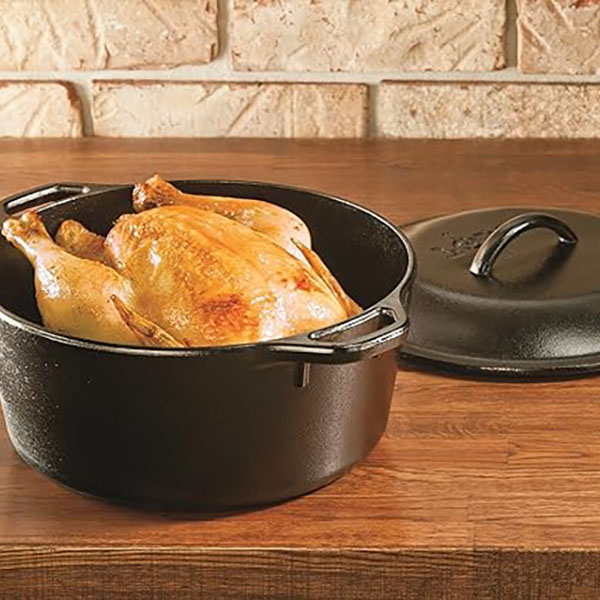
Delving into the world of **Best bone broth recipes** unlocks a treasure trove of health benefits and culinary delights. Globally cherished for its dense nutritional value and robust taste, bone broth serves as a fundamental ingredient in culinary practices. But why stick to the basics when you can elevate your broth game? From understanding its nutritional powerhouse to mastering beef and chicken bone broths with an Instant Pot or slow cooker, this guide is your all-in-one resource. Dive into selecting the perfect bones, utilizing apple cider vinegar to its fullest, and preserving your crafted broth for enduring freshness. Get ready; it’s time to transform simple ingredients into something extraordinary.
Need the ultimate cookware? Check out the Lodge Cast Iron Store Today!
Skip directly down to our PFF Dutch Oven Chicken Bone Broth Recipe
This post may contain affiliate links which means Pints, Forks & Friends may receive commission for purchases made through links. We only recommend products that we personally believe in and use. Learn more on our Privacy Policy page.
5 Quart Seasoned Cast Iron Dutch Oven
Free Delivery for Amazon Prime Members!
Best Bone Broth - Table of Contents
Table Of Contents:
- The Basics of Bone Broth: Understanding Its Nutritional Powerhouse
- Crafting Your First Beef Bone Broth Recipe
- Enhancing Flavor and Nutrition with Additional Ingredients
- The Art of Making Chicken Bone Broth
- Storing Your Homemade Bone Broth Effectively
- FAQs in Relation to Best Bone Broth Recipes
- Conclusion
The Basics of Bone Broth: Understanding Its Nutritional Powerhouse
Imagine a world where your morning cup of joe is replaced with something far more ancient and arguably, much more beneficial. Yes, we’re talking about bone broth, the liquid gold that’s been simmering in pots across civilizations for centuries. But why? So, what’s the big deal about this hearty concoction we call bone broth?
Bone Broth: A Rich Source of Essential Nutrients
At its core, bone broth is simple—it’s water simmered with animal bones, maybe some veggies and herbs for good measure. However, within this simplicity lies a complex array of essential nutrients like calcium and magnesium found abundantly in beef bones or chicken bones used to make the broth. These minerals are building blocks for our own bone health.
Add to that collagen and gelatin—two proteins extracted during the long cooking process—from connective tissue which not only support skin elasticity but also play crucial roles in joint health by helping reduce pain associated with arthritis or other joint issues. It’s almost like drinking from the fountain of youth if such a thing existed.
Amino Acids Galore
If you thought those gym supplements had the monopoly on amino acids think again. Sipping on bone broth gives you access to these protein building blocks vital for everything from muscle repair to immune function without having to choke down another chalky shake. With regular intake, it might just help ease symptoms related to leaky gut syndrome too by supporting intestinal integrity.
Beef vs Chicken Broth: The Eternal Debate
The battle between beef and chicken broths is less Game of Thrones and more personal preference mixed with nutritional nuances. Beef bone typically offers higher mineral content due especially high levels when using marrow-rich bones whereas chicken can boast a superior gelatin content perfect for those looking specifically at improving skin texture or digestive health benefits linked closely together through their respective contributions towards overall wellness strategy tailored perfectly according individual needs preferences making both equally worthy contenders title ‘superfood.’
In essence, bone broth isn’t just your grandmother’s remedy; it’s backed by science as an effective way enhance well-being thanks wealth contained therein proving once again sometimes old ways best especially comes nurturing bodies naturally without resorting pills potions modern medicine often pushes upon us seeking simpler solutions ailments plague society today so next time feel under weather consider reaching pot instead pharmacy see difference firsthand experience true power held within these seemingly humble ingredients combined create something truly magical healing properties cannot overstated enough. So go ahead, give try – body will thank later.
Key Takeaway: Swap your morning coffee for bone broth to tap into its ancient, nutritional benefits. Loaded with essential minerals, collagen, and amino acids, it supports bone health, skin elasticity, joint comfort, and more. Whether you prefer beef or chicken broth depends on personal taste and specific health goals.
Crafting Your First Beef Bone Broth Recipe
Selecting the Right Beef Bones
Imagine wandering through a butcher shop, eyes wide, searching for the secret to a rich and nutritious beef bone broth. It’s not just any bones you need; it’s about finding those with plenty of marrow. Marrow bones, along with knuckles and cuts rich in connective tissue, are your golden tickets.
The reason is simple: these types of beef bones pack a punch in terms of flavor and nutrients. But don’t just take my word for it; chefs around the globe swear by using a mix to create that perfect base. So next time you’re at the market or butcher shop, make sure to grab some marrow bones alongside those meaty ribs and knuckles.
The Role of Apple Cider Vinegar
Now let’s talk about apple cider vinegar—your broth’s best friend. This isn’t just folklore; adding cider vinegar helps break down collagen in animal bones into gelatin, enriching your broth both nutritionally and texturally.
A splash (we’re talking 1-2 tablespoons) doesn’t alter taste but works magic on releasing all those precious minerals from within the bones during cooking. Why apple cider vinegar? Its acidity level is perfect for this job without overwhelming your senses when sipping on that final product.
Cooking Methods Compared
If patience were an ingredient, making bone broth would require heaps of it—but thanks to modern technology like pressure cookers or Instant Pots—we can cut down significantly on brewing time while still achieving delicious results compared to traditional slow cooker methods.
- A pressure cooker, ready in hours rather than days. These devices work wonders by ramping up pressure inside their chamber thus speeding up extraction process efficiently.
- Slow cookers, on another hand are set-and-forget heroes perfect if you prefer gentle simmer across longer periods.
- Last but definitely not least comes our beloved Instant Pot. It combines benefits from both worlds offering quick yet thorough extraction phases leaving us with deeply flavorful broths every single time.
- Add herbs like bay leaves enhance flavors bringing subtle aromatic notes balancing out richness beautifully.
- Veggies aren’t just fillers—they contribute layers upon layers nutritional values plus help mellow down intense tastes making each sip more complex intriguingly so.
- Absolutely, dabbling in various spices can profoundly uplift your concoctions, propelling them to unparalleled heights. Tossing in a few black peppercorns or a clove of garlic can majorly boost the taste, enabling you to concoct drinks that align precisely with your flavor desires.
Key Takeaway: Find the right beef bones with marrow and connective tissues for a nutrient-rich broth. A dash of apple cider vinegar helps extract minerals without changing the taste. Use modern cookers for quicker results, but don’t forget to add herbs and veggies for extra flavor and nutrition.
Enhancing Flavor and Nutrition with Additional Ingredients
Vegetable Add-ins for Extra Vitamins
If you thought bone broth couldn’t get any more nutritious, think again. Tossing in some veggies can turn your simmering pot into a vitamin powerhouse. Imagine carrots, onions, and celery doing the backstroke in that savory pool – not only do they add layers of flavor but also pack a punch of vitamins A, C, and K.
But don’t stop there; why not let kale or spinach join the party? Kale and spinach jump in, infusing the blend with iron and a surge of antioxidants, making the whole thing come alive. Remember to give those bones veggies company only during the last few hours of cooking though; we want them tender yet potent.
To really elevate things without much effort, drop in some garlic bay leaves combo. This dynamic duo doesn’t just whisper sweet nothings to your taste buds; they shout ‘flavor’ from the rooftops while slipping in their health benefits on the down-low.
Spices and Herbs for a Flavorful Twist
Sometimes all it takes is a pinch or two of magic dust (a.k.a spices) to transform your basic broth into an enchanting elixir. Throwing black peppercorns into this potion will add warmth that’s as comforting as receiving a bear hug from grandma – spicy but filled with love.
Fresh herbs like rosemary or thyme act as nature’s perfume for your pot bone broth concoction. They’re not just window dressing either; these green beauties come loaded with anti-inflammatory properties that can soothe even the most stubborn gut issues or joint pains – proving once again that Mother Nature knows best when it comes down to healing us inside out.
The trick here isn’t about bombarding your brew with every herb under the sun but finding balance through experimentation – because at its heart making homemade bone broth is akin creating art: subjective creative freeing. So go ahead experiment find what sings soul tastes right kind soup symphony await discovery by adventurous spirit kitchen adventurers alike.
Remember how we mentioned apple cider vinegar earlier? Here’s where it does its solo performance by ensuring all those minerals locked up tight within animal bones are released into their watery stage below — allowing us drink up goodness without having gnaw actual pieces themselves.
Lastly if ever feel need little extra something-something consider adding another splash water ensure none glorious flavors escape unnoticed due pressure cooker slow cook method choice dictate.
Incorporating these components into your culinary practice transforms it from mere food preparation to an art form, enhancing the entire endeavor. With an Instant Pot and a dash of creativity, anyone can create amazing batches of broth that far surpass anything you’d find on a store shelf. This isn’t just about satisfying cravings—it’s about offering deep, nourishing sips that promise both health and happiness.
Key Takeaway: Boost your bone broth with veggies like carrots and kale for extra vitamins, and don’t forget spices and herbs for that flavor kick. It’s not just soup; it’s a health potion in the making. Let creativity lead your cooking adventure.
The Art of Making Chicken Bone Broth
Choosing Chicken Bones for Broth
When it comes to crafting a chicken bone broth recipe that’s both delicious and packed with nutrients, not all bones are created equal. To achieve that sought-after high gelatin content—which is the secret sauce for gut health, joint support, and smooth skin—your go-to should be a mix of bony parts. Think chicken feet, necks, and backs.
Opting for this mix not only enhances the taste but significantly boosts the nutritional value as well. These parts have more connective tissue which translates into more collagen in your broth. And let’s face it: when you’re simmering something on your stove for hours, you want every scoop to count towards your well-being.
Cooking Time and Techniques
Patience is key here because good things come to those who wait—or rather simmer slowly over low heat. The golden timeframe? Aim for 24 hours if using a traditional stovetop method or at least 12 hours if an Instant Pot is more your speed. This slow dance allows enough time for the water to coax out all those precious nutrients from the bones while maintaining a gentle bubble.
A crucial step in this process involves reducing heat once you’ve brought everything to a boil—a simple yet effective way of ensuring maximum extraction without boiling off too much liquid too quickly.
In our fast-paced world where instant gratification reigns supreme, making homemade chicken bone broth stands as a testament to the artistry involved in cooking from scratch. It teaches us patience and rewards us with depth—in both flavor and nutrition—that no store-bought version can match.
For beginners looking to try their hand at making homemade broths, remember these tips: select varied types of chicken bones rich in connective tissues like feet or necks; aim long on cooking times whether via stovetop or pressure cooker methods; never forget the power move of lowering heat post-boil; embrace this culinary journey as one part science experiment—and two parts love letter—to food tradition spanning generations.
Key Takeaway: For top-notch chicken bone broth, mix bones like feet and necks for more collagen. Slow cook it—24 hours on the stove or 12 in an Instant Pot—and remember to lower the heat after boiling. It’s a blend of patience, tradition, and nutrition.
Storing Your Homemade Bone Broth Effectively
Refrigeration Tips
You’ve just spent hours simmering the perfect batch of bone broth, rich with nutrients and flavor. What’s the trick to preserving that sumptuous, nutrient-packed broth you’ve lovingly crafted? First off, let’s talk refrigeration. After cooling your bone broth to room temperature (never skip this step.), transfer it into smaller containers. Why? Smaller volumes chill faster, reducing the risk of bacteria setting up camp.
The key here is not to fill these containers to the brim. Leave about an inch of space at the top because – science alert – liquids expand when they freeze. If you’re using glass jars, consider this non-negotiable unless you enjoy cleaning up exploded glass from your fridge. A solid tip is placing a date on each container; cooled bone broth will happily sit in your refrigerator for up to five days begging to be used.
Freezing for Long-Term Storage
If whispers of ‘winter is coming’ are floating around or you’re just a savvy planner thinking ahead, freezing your homemade treasure is the way to go for long-term storage. Here’s where ice cube trays become your best friend—pour broth into trays and once frozen solid, pop those cubes out into freezer bags.
This method isn’t just about saving space; it’s also genius for portion control. Need a cup of broth for that risotto recipe? Grab a handful of cubes rather than defrosting an entire jar. But remember: label those bags with content and date before they disappear into Narnia-like depths of your freezer where time loses all meaning. Properly stored frozen bone broth can last several months but trust me when I say its magical properties diminish over time so aim to use within six months.
To sum things up neatly like grandma’s knitting basket: whether chilling in the fridge or tucked away in deep freeze slumber awaiting their grand reveal during soup season – treating store-bone-broth right means maximum flavor and nutrition whenever you need it most. Check out Food Safety Guidelines to make sure everything stays cool (pun intended) as far as food safety goes.
Key Takeaway: Keep your homemade bone broth fresh and full of flavor by cooling it first, then storing in small containers in the fridge for up to five days. For longer storage, freeze in ice cube trays for easy portion control and use within six months for best taste.

Pints, Forks & Friends Special Bone Broth Recipe
We’re thrilled to share with you a gem of culinary craft—a Dutch Oven Chicken Bone Broth that transcends the ordinary. This isn’t just broth; it’s a narrative of flavor, a testament to the power of simplicity, and a celebration of homemade goodness. Gather around as we delve into this special recipe, promising to add depth and character to your meals and become a cherished staple in your culinary repertoire.
Yield: Approximately 4 cups of pure, heartwarming broth
What You’ll Need:
- Leftover carcass and vegetable scraps from your last Dutch Oven Roasted Chicken feast
- 8-10 cups of water, just enough to lovingly envelop the bones
- A tablespoon of apple cider vinegar, the secret handshake that unlocks the full potential of the broth
Embarking on this broth journey, you’ll rediscover the beauty of transforming simple leftovers into a rich, dark elixir that rivals the finest gravies.
Let’s Get Cooking:
- The Encore: Begin with the remnants of a joyous roasted chicken meal. Those bones and skin, along with any vegetable scraps, are not done yet. They’re about to give an encore performance in your Dutch oven. Leave in all the flavorful bits and juices—they’re the unsung heroes of this story.
- The Elixir: Cover the ensemble with water, ensuring a snug fit, and introduce a tablespoon of apple cider vinegar. This isn’t just cooking; it’s alchemy. The vinegar gently persuades the bones to release their treasure trove of nutrients and flavors.
- The Transformation: With everything nestled inside, cover your Dutch oven and place it in an oven preheated to 325°F. Here, patience is a virtue. Over 5 to 6 hours, a transformation occurs, turning water into a broth so rich, so deep in flavor, it’s like liquid gold.
- The Finale: After the slow roasting, carefully strain the broth, pressing on the solids to capture every essence of flavor. This step is like the final act, ensuring your broth is smooth, clear, and ready to impress.
- The Encore: Allow your broth to cool, then store it in the refrigerator. A layer of fat will form on top—think of this as a bonus for your future culinary adventures. The broth will keep for about 5 days in the fridge or can be frozen for later use. Remember, this broth packs a flavor punch, so feel free to dilute it to your taste in future dishes.
This Dutch Oven Chicken Bone Broth is more than a recipe; it’s a ritual, a way to bring friends and family together, to share in the joy of cooking and the pleasure of eating. It’s a reminder that great food comes from the heart and that the best meals are those shared with others. So here’s to many more shared meals, laughter, and the endless joy of cooking with Pints, Forks & Friends. Cheers to good food and even better company!
FAQs in Relation to Best Bone Broth Recipes
What is the best bones to use for bone broth?
Marrow and knuckle bones are top picks. They’re packed with collagen, making your broth rich and nutritious.
Is it OK to drink bone broth every day?
Absolutely. Drinking it daily supports gut health and joint comfort. Just keep an eye on your portions.
How to make bone broth that tastes good?
Roast the bones first. Then simmer with herbs, veggies, and a splash of apple cider vinegar for flavor depth.
Which bone broth has the most benefits?
Chicken bone broth wins because of its high gelatin content which is great for skin, joints, and gut health.
Conclusion
Embarking on the journey of crafting the best bone broth recipes, you’ve unlocked a wealth of nutrition and flavor. You learned that bones are not just bones; they’re vessels of minerals like calcium and magnesium. They give us collagen for our joints and skin.
Picking beef or chicken, using apple cider vinegar to draw out those nutrients, and choosing your cooking method—Instant Pot or slow cooker—all shape your broth’s richness.
Add-ins aren’t just extras; they’re power-ups for both taste and health. Spices, herbs, veggies—they transform good into great.
Storing it right means enjoying this liquid gold any day. Freeze it or cool it in the fridge; your future self will thank you.
Taking the time and embracing simplicity are at the heart of creating something truly remarkable. Start with quality ingredients, let them simmer slowly, strain carefully—and there you have it: a homemade miracle packed with goodness.
Find us on Amazon! Pints, Forks & Friends Shop
The Latest…
Christmas Ale Bacon Recipe
The Ultimate Christmas Ale Bacon Recipe: Joy in Every...
Discovering Meat Church Recipes: BBQ, Beer & Texas Flavors!
Exploring Meat Church recipes is like embarking on a...
Exploring Yakamein: New Orleans’ Hidden Culinary Treasure
Think you got what it takes to navigate a soup bowl? Allow...





